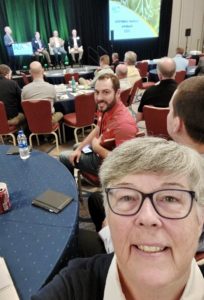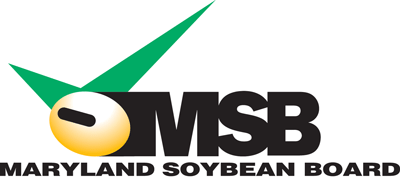Soy Checkoff Builds Value for Maryland Soybean Farmers
 The Maryland Soybean Board (MSB) recently released their Soybean Sampler Annual Report, demonstrating how the soy checkoff has worked to build value for Maryland farmers over the past year. In 2021, the farmer leaders of MSB voted to fund over $440,000 in priority projects outlined in their strategic plan including Animal Agriculture, Consumer Education, Emerging Markets, Farmer Engagement, and Production Research.
The Maryland Soybean Board (MSB) recently released their Soybean Sampler Annual Report, demonstrating how the soy checkoff has worked to build value for Maryland farmers over the past year. In 2021, the farmer leaders of MSB voted to fund over $440,000 in priority projects outlined in their strategic plan including Animal Agriculture, Consumer Education, Emerging Markets, Farmer Engagement, and Production Research.
“For every dollar that is invested in the soy checkoff, farmers received $12.34 in added value,” explains MSB Chair Joshua Appenzeller. “We prioritize our investments in projects that address local issues and positively impact farmer’s operations.”
Highlights include projects to promote rural road safety by utilizing their Find Me Driving resources; build consumer trust through projects such as My Maryland Farmers and CommonGround; leadership training for farmers to benefit their communities; and a research field day that allowed growers the opportunity to learn about how checkoff funded research can be applied on their farms.
More information about these projects can be found in the Annual Report.
Administered by MSB, the checkoff is a 100% farmer-funded program that invests in research, marketing, and education to maximize the profitability of Maryland soybean producers. MSB’s Board of Directors is made up of ten volunteer soybean farmers, each appointed for a three-year term, along with ex-officio members representing agribusiness, the Maryland Department of Agriculture, and the University of Maryland.
In Maryland, farmers grow about a half a million acres of soybeans, producing more than 20 million bushels of beans each year. With a value of $173 million to the state’s economy, soybeans are one of Maryland’s top crops. The checkoff program is funded by farmers through an assessment of one-half of one percent of the net market value of their soybeans at the first point of sale. One-half of the checkoff funds stay in Maryland for programs; the other half is sent to the United Soybean Board.
For more information on the Maryland Soybean Board, explore www.mdsoy.com.
# # #
Danielle Bauer Farace, Executive Director
Maryland Soybean Board
Office: 443.812.4526
danielle@mdsoy.com
Safety First is Family First
Seven Steps to Reduce Stress on the Farm
 As the backbone of our communities, agriculture focuses on the health of farms, environment, crops and animals – but now there is a focus also on the farmer, family and farm employees. The nature of farming has unique challenges and stressors that only those imbedded in them understand.
As the backbone of our communities, agriculture focuses on the health of farms, environment, crops and animals – but now there is a focus also on the farmer, family and farm employees. The nature of farming has unique challenges and stressors that only those imbedded in them understand.
“The topic of farm stress management and farm resiliency has gained interest in the last 18 months,” stated Shannon Dill, Extension Educator with the University of Maryland. “Whether the pandemic, markets, health care or media have increased the conversation, it is an important one to have.”
Extension programs have been stepping to the plate to help farmers. Dill is a member of an expert team of extension educators who, with the support from a NorthEast SARE grant and a partnership with USDA NIFA and Maryland Department of Agriculture, have created and expanded resource tools for managing farm stress.
While ordinary stress occurs on a regular basis, sustained distress over longer periods of time can cause safety risks for you and those around you. On the farm sustained distress can affect a person’s ability to cope, make sound decisions, and adopt new practices associated with their health, finances, regulatory, and production practices.
As spring arrives there is much to do around the farm – cleaning up from winter, preparing for planting season and timing everything just right to avoid the late frost or spring thunderstorm. It is easy to put health care and personal wellness on hold, but they should also be part of the preparations for the growing season.
Here are seven ideas to manage stress on the farm Dill recommends:
- Have a plan and get organized
Gather your team of family members and employees to develop a plan for activities and responsibilities. Writing out the to-do list, timeline and who is responsible will help prioritize and delegate tasks.
- Try to get a good night’s sleep
It can be difficult to sleep well during stressful times, but sufficient rest is key to staying healthy. Have a night-time routine in place and reduce the use of electronics.
- Build your support team and communicate
We all need help sometimes. Develop a team of experts, advisors, friends and family that can support you and your farming operation. And know when to ask for help. Keep communication lines open and be honest about your struggles and be willing to listen to others’ concerns.
- Watch your diet and nutrition
Stress eating or not eating can be tempting in times like this. A balance of fruits, vegetables, and proteins will help your body and mind stay healthy. Increase your water intake and reduce processed and fast food.
- Limit alcohol and other drugs
Watch your intake of alcohol or other drugs, and discuss use with a doctor or mental health professional. There are a number of resources for farmers feeling overwhelmed or hopeless.
- Take a time out
It is hard to imagine taking time out of the day when there is so much to do but recharging is important. Perhaps it is engaging in prayer, meditation, or physical exercise for your mental, physical, and spiritual health. Just 10 or 15 minutes can help you feel refreshed and ready to focus again.
- Keep each other accountable
Talk with friends and family regularly to hold each other accountable to healthy habits. It is ok to ask, “Are you ok?”, “Are you sleeping alright?”, or “Have you eaten today?”
Multiple resources are available as the importance of stress management has grown. A national database of resources is available at https://soygrowers.com/soyhelp-national-resources-info/. Promoting safety efforts such as these have been made available to farmers by the soy checkoff.
More resources are available on Farm Stress Management at www.go.umd.edu/farmfamily. Choose from Financial Resources, Stress Management, or Legal Resources to find a variety of online information, guides, and tools developed to help in each of these areas.
Also, UM Extension and the University of Delaware Extension worked together to develop their publication Farm and Farm Family Risk and Resilience Guide to Extension Educational Programming. UDE offers further resources at https://www.udel.edu/academics/colleges/canr/cooperative-extension/nutrition-wellness/got-your-back/.
The goal of all these efforts is to raise awareness, provide training and build educational resources for communities struggling with mental and behavioral health challenges.
Road Safety Campaign Aims to Keep Farmers Safe
Creative tools available to help farmers and farm-employees take to the road safely.
Aiding U.S. farmers in getting home safely to their families every night is a priority for your soy checkoff. While farming may be one of the most rewarding occupations, it’s also one of the most dangerous. With the support of the United Soybean Board and the Delaware Soybean Board, the Maryland Soybean Board developed the Find Me Driving “Road Safety” campaign, aimed to raise motorists’ awareness of farm equipment drivers on the roads during the spring, summer and fall. The campaign also offers farmers tools for best practices in driving slow moving vehicles (SMVs) on roadways. Through the campaign, various resources — such as training videos, safety posters and window clings for your tractor and combine — were developed to help keep farmers and others safe on the road.
“Farmers driving SMVs can do so much to raise awareness of their presence on the road to other faster-moving vehicles,” said Belinda Burrier, Chair of the United Soybean Board Communication and Education Committee and Maryland farmer. “It comes down to operational best practices when moving farm equipment from one location to another, and each farm equipment driver should follow the safety tips available from this campaign to help ensure their safety and the safety of others.”
 One particular asset created for the campaign is the road safety window cling, which took home a regional first place “Best of NAMA” award this year. The National Agri-Marketing Association’s awards program honors the best work in agricultural communications. Placed in the cab of a slow moving vehicle, the cling reminds drivers of basic safety checks to make before driving on a public road:
One particular asset created for the campaign is the road safety window cling, which took home a regional first place “Best of NAMA” award this year. The National Agri-Marketing Association’s awards program honors the best work in agricultural communications. Placed in the cab of a slow moving vehicle, the cling reminds drivers of basic safety checks to make before driving on a public road:
- Reflective materials and SMV emblem are displayed and clean.
- Brake pedals are locked together for even stops.
- Required lights and warning flashers are on; turn off rear facing work lights.
- Mirrors are clean and adjusted for clear views.
- Tires are at the maximum recommended pressure and wheel bolts are tight.
- Route conditions are clear of road construction, bad weather and accidents.
“We encourage all farm organizations to promote the road safety campaign tools with their farmers and share the road safety information with their non-farming neighbors driving the same rural roads with our farm equipment,” concluded Burrier.
The Find Me Driving campaign website has a collection of safety-related resources for general motorists and SMV drivers including checklists, training videos, driving statistics and tips, and safety articles.
# # #
About Maryland Soybean Board: In Maryland, farmers grow about 500,000 acres of soybeans, producing more than 20 million bushels of beans each year. With a value of $173 million to the state’s economy, soybeans are one of Maryland’s top crops. The checkoff program is funded by farmers through an assessment of 0.5% of 1% of the net market value of their soybeans at the first point of sale. One-half of the checkoff funds stay in Maryland for programs; the other half is sent to the United Soybean Board. See more at www.mdsoy.com.
About United Soybean Board: United Soybean Board’s 78 volunteer farmer-directors work on behalf of all U.S. soybean farmers to achieve maximum value for their soy checkoff investments. These volunteers invest and leverage checkoff funds in programs and partnerships to drive soybean innovation beyond the bushel and increase preference for U.S. Soy. That preference is based on U.S. soybean meal and oil quality and the sustainability of U.S. soybean farmers. As stipulated in the federal Soybean Promotion, Research and Consumer Information Act, the USDA Agricultural Marketing Service has oversight responsibilities for USB and the soy checkoff. For more information on the United Soybean Board, visit www.unitedsoybean.org.
Soybean Farmers Enhance Leadership Skills
 Maryland farmers Belinda Burrier of Union Bridge and Shane King of Princess Anne took a trip to the Sunshine State to attend the American Soybean Association’s (ASA) Soybean Leadership Academy earlier this month. The two joined more than 100 other grower leaders and staff in Bonita Springs, Florida to take part in the two-day training, designed to provide tools and techniques that enable state and national soybean board and association leaders to be more effective, efficient, and inspired leaders. Throughout the program, participants had the opportunity to engage with speakers and each other.
Maryland farmers Belinda Burrier of Union Bridge and Shane King of Princess Anne took a trip to the Sunshine State to attend the American Soybean Association’s (ASA) Soybean Leadership Academy earlier this month. The two joined more than 100 other grower leaders and staff in Bonita Springs, Florida to take part in the two-day training, designed to provide tools and techniques that enable state and national soybean board and association leaders to be more effective, efficient, and inspired leaders. Throughout the program, participants had the opportunity to engage with speakers and each other.
“As a first-time attendee of the Soybean Leadership Conference, I really enjoyed myself and learned a lot from the various speakers,” remarked King. “I value and applaud the effort and time that the ASA puts into training farmers and leaders in our industry. It was great meeting new people and discussing the future of the soybean industry.”
Featured speakers included Jennifer Coleman, Aimpoint Research; Mary Byers, author, Race to Relevance; Jim Meffert, Tecker International; Michael Gallery, Opis; Scott Hutchins, consultant and Ebony Webber, MANRRS. The program also featured a panel on the future of fuel with Alan Weber, Marc IV, Nathan Crum, Valley Pacific Petroleum and ASA Economist Scott Gerlt. A grower panel featuring Brad Doyle, ASA president; Ralph Lott, USB chair and Monte Peterson, USSEC chair/ASA director capped off the event.
“I always enjoy attending the Soybean Leadership Academy,” said Burrier. “We get to meet farmers who want to expand their knowledge base and learn about new issues on the horizon for our industry. It’s a good way to mentor the next generation of farmer and network with likeminded people.”
In Maryland, farmers grow about a half a million acres of soybeans, producing more than 20 million bushels of beans each year. With a value of $173 million to the state’s economy, soybeans are one of Maryland’s top crops. The checkoff program is funded by farmers through an assessment of one-half of one percent of the net market value of their soybeans at the first point of sale. One-half of the checkoff funds stay in Maryland for programs; the other half is sent to the United Soybean Board.
For more information on the Maryland Soybean Board, visit www.mdsoy.com.
# # #
Danielle Bauer Farace, Executive Director
Maryland Soybean Board
Office: 443.812.4526
danielle@mdsoy.com
Archives
Soybeans Fuel Local Food Donations
Maryland soybean farmers applaud their number one customers in animal agriculture who aided in keeping food on table for local families during unprecedented times. According to the Maryland Food Bank, agricultural corporations such as Perdue Farms, Inc., Smithfield...
Soybean Growers Participate in Virtual Leadership Training
Two Maryland farmers participated in the American Soybean Association’s Soybean Leadership Academy earlier this month. Belinda Burrier of Union Bridge, and Evan Staley of New Windsor, both representatives of the Maryland Soybean Board, joined over 160 other...
Maryland Soybean Board Invests in Promotion
For the 2021 fiscal year, the Maryland Soybean Board has invested over $190,000 in projects to promote soybeans and their many by-products. The board of farmer directors identified target areas of funding as Animal Agriculture, Consumer Education, Emerging Markets,...
Burrier Re-Elected to USB Executive Committee
The Maryland Soybean Board congratulates Belinda Burrier on her re-election to the United Soybean Board (USB) Executive Committee for 2021. Burrier was first elected to the Executive Committee this past year and was one of the first two individuals from the East Coast...
SAM Wins Maryland Soybean Board Naming Contest
With more than 90 entries coming in from across the country, Marylander Natalie Grasso came up with the winning name for the www.FindMeDriving.com character naming contest. “SAM” is the face of the new road safety campaign initiated by the Maryland Soybean Board...
New Specialty Soybean Contracts Available to Mid-Atlantic Farmers
Mid-Atlantic farmers can lock in new premiums by selecting high oleic soybeans for the 2021 growing season. Many Delmarva-area farmers have already decided to take advantage of this opportunity due to the minor adjustments needed from growing commodity soybeans and...
Burrier Elected First Female Chair of Maryland Soybean Board
Belinda Burrier of Union Bridge has made history in the local soybean industry since beginning her term on the Maryland Soybean Board (MSB) in 2011. Burrier was the first woman to serve on the board; was one of the first two individuals from the East Coast to serve on...
MSB Launches Road Safety Campaign with Naming Contest
As combines take to the fields to harvest fall crops, the risks of accidents on rural roads rises. Slow-moving vehicles (such as farm machinery, animal-drawn vehicles and construction equipment), are identified as traveling at speeds of 25 m.p.h. or less, and can pose...
MSB Seeks Research Projects
The Maryland Soybean Board (MSB) is looking for research projects focused on soybean production and animal agriculture for the 2021 growing season. Pre-proposals are now being accepted through October 15, 2020. “We encourage researchers to submit new project ideas...
Maryland Soybean Board Seeks Projects to Promote Soybeans
If you have an idea to use or promote soybeans or its many byproducts, the Maryland Soybean Board would like you to submit a proposal for their coming fiscal year beginning October 1, 2020. The all-farmer board, which administers the national soybean checkoff...
